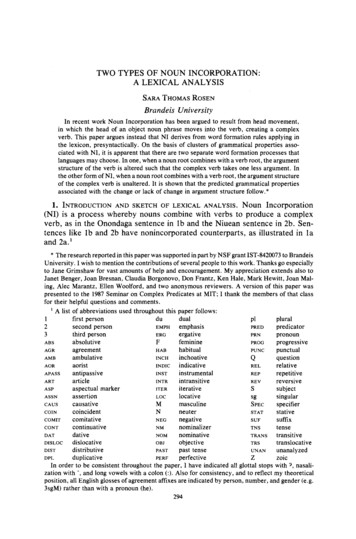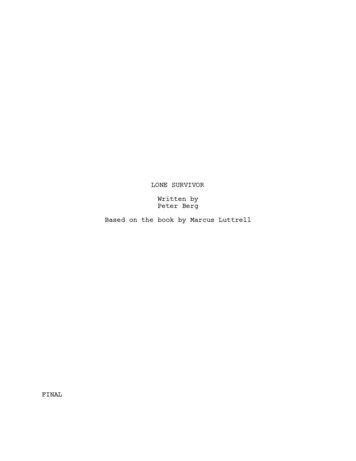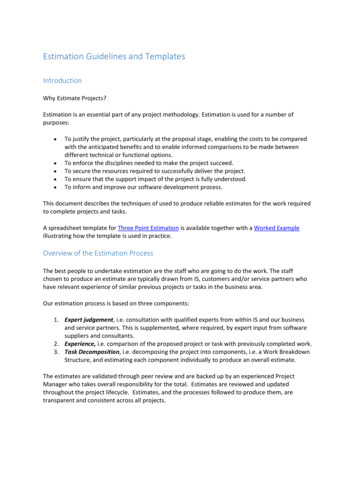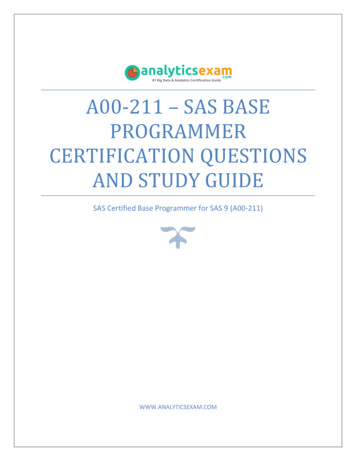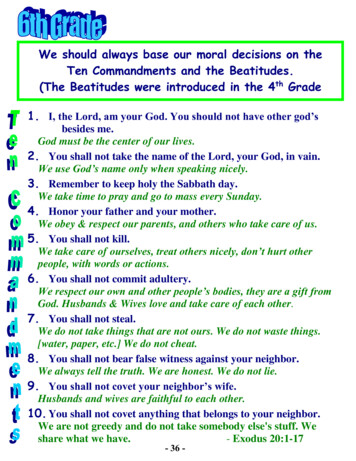
Transcription
We should always base our moral decisions on theTen Commandments and the Beatitudes.(The Beatitudes were introduced in the 4th Gradesection)1. I, the Lord, am your God. You should not have other god’sbesides me.God must be the center of our lives.2. You shall not take the name of the Lord, your God, in vain.We use God’s name only when speaking nicely.3. Remember to keep holy the Sabbath day.We take time to pray and go to mass every Sunday.4. Honor your father and your mother.We obey & respect our parents, and others who take care of us.5. You shall not kill.We take care of ourselves, treat others nicely, don’t hurt otherpeople, with words or actions.6. You shall not commit adultery.We respect our own and other people’s bodies, they are a gift fromGod. Husbands & Wives love and take care of each other.7. You shall not steal.We do not take things that are not ours. We do not waste things.[water, paper, etc.] We do not cheat.8. You shall not bear false witness against your neighbor.We always tell the truth. We are honest. We do not lie.9. You shall not covet your neighbor’s wife.Husbands and wives are faithful to each other.10. You shall not covet anything that belongs to your neighbor.We are not greedy and do not take somebody else's stuff. Weshare what we have.- Exodus 20:1-17- 36 -
The formation of a good and right conscience is afundamental element of Christian moral teaching.Since we have the obligation to obey our conscience, wealso have the great responsibility to see that it is formedin a way that reflects the true moral good.- USCCA pages 314 & 315Assertiveness inexpressing their right tobodily integrity andpersonal boundaries,including respectfullanguage should beapparent.The demonstration ofbehaviors and attitudesthat foster sensitivity,appreciation and respectfor all people shouldalso be apparent.Children must have a sense of personal and socialresponsibility and be aware thatthere are consequences totheir choices and actionsbecause of the sacredness oflife, the equality of all peoples,races, and ethnic groups andJesus’ love and mercy towardsthe poor.- 37 -
The Bible is a collection of many books. The writers of the Bible wereinspired by God and wrote in a way that the people of their timewould understand.Law – the first five books of the Bible called the Pentateuch, whichmeans “five scrolls”. These books are also called theTorah. They tell the story of the creation, covenantand how God cared for his people on their journeyto the promised land.Historical Books – These books show that God cared for hisPeople during their history. They are not alwayscomplete or scientifically or historically accurate. Theirpurpose is to remind the Hebrew people that God waswith them during all of the events of their lives.Wisdom Books – tell people how to live wisely. Theyshow the Israelite people how to act and pray. Theycontain psalms, poems, prayers, sermons, proverbsand parables.Prophetic Books – tell about the prophets and their messages.When the people had turned away from God, theprophets brought their thoughts back to God andreminded them of His love for them. The prophets alsotold the people to be just to one another.Help your child to use the psalms and other scripturalpassages in prayer.You might begin with “The Canticle of Zechariah” inLuke 1:15-25, 57-80 or maybe Psalm 51:3-4, 12, 14, 19.- 38 -
Follow the development of the Covenant relationshipof salvation historythrough the following Scripture passages: A Covenant isa solemn agreement, much more than a promise!)Genesis 7:1-24NoahGenesis 11:1-9Tower of BabelGenesis 12:1-9, - 17:1-8 AbrahamBook of ExodusMosesKings 19:9-18Elijah meets GodEzra 3:1-13Call of IsaiahJeremiah 1:4-19Call of JeremiahRuth 4:10-17RuthSamuel 16:1-13; 17:12-58 David & GoliathHow did these saints follow their calland respond to God?St. Agnesof RomeSt. Vincentde PaulSt. PaulMiki39
Jesus used the Jewish Passover meal to institute ourEucharist Liturgy. Many of the prayers used in theEucharistic Prayer came from our Jewish ancestors.Old Testament Books of the ophetic ahHaggaiZechariahMalachiHistorical BooksJoshuaJudgesRuth1 Samuel2 Samuel1 Kings2 Kings1 Chronicles2 ChroniclesEzraNehemiahTobitJudithEsther1 Maccabees2 MaccabeesYour children should beable to recite andexplain the Apostle’sCreedThe Apostle’s Creed wasintroduced in the 3rd Grade.Wisdom BooksPsalmsProverbsEcclesiastesSong of SongsWisdomSirachJob- 40 -
Assertiveness in expressing their right to bodily integrity and personal boundaries, including respectful language should be . also be apparent. - 37 - The Bible is a collection of many books. The writers of the Bible were inspired by God and wrote in a way that the people of their time would understan

